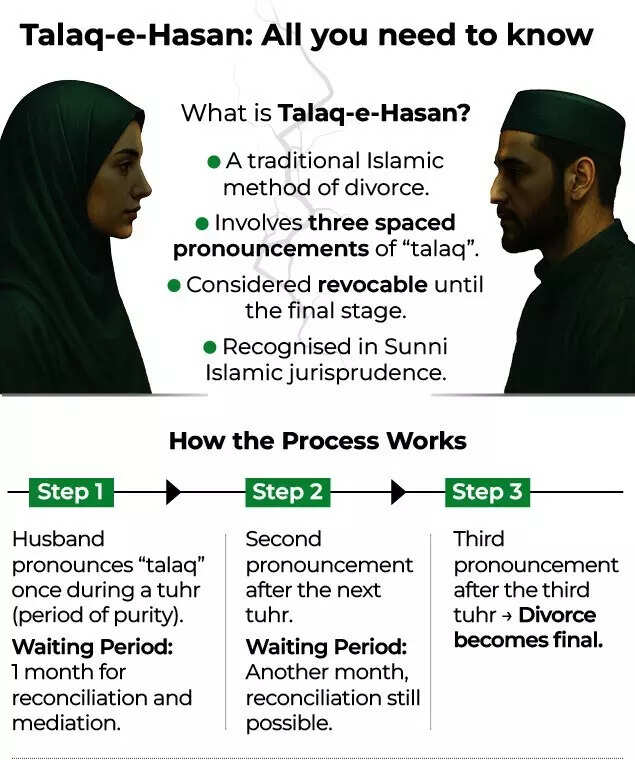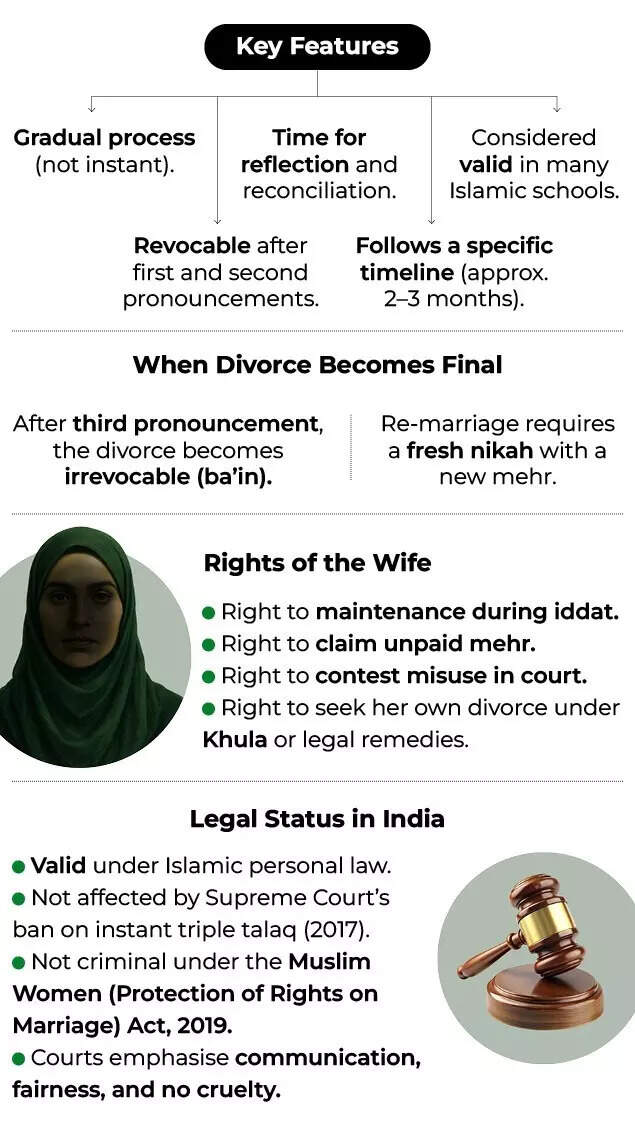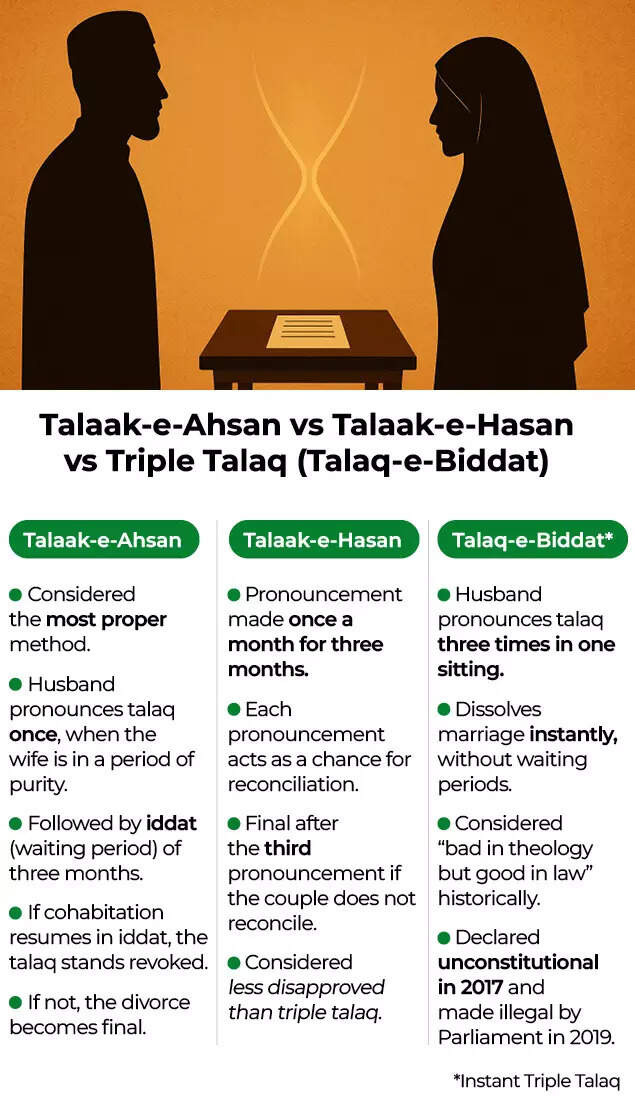NEW DELHI: The Supreme Court, while hearing a petition challenging the unilateral use of Talaq-e-Hasan, on Wednesday questioned the validity of a growing practice in which Muslim men authorise lawyers to issue monthly talaq notices on their behalf. Examining the case of journalist Benazeer Heena, the bench observed that such notices, issued without the husband’s signature, could not be treated as a valid dissolution of marriage. The Court warned that delegating talaq to lawyers or third parties exposes women to serious legal vulnerabilities, including the possibility of being accused of polyandry if they enter another marriage under the mistaken belief that the first marriage has been legally dissolved. The matter, already before the apex court through multiple petitions, has now brought renewed attention to the constitutional and procedural validity of Talaak-e-Hasan.The bench of Chief Justice-designate Surya Kant, along with Justices Ujjal Bhuyan and N K Singh, expressed strong reservations about this emerging practice, reiterating that talaq requires the husband’s direct pronouncement and signature. When senior advocate M R Shamshad, appearing for the husband, argued that such delegation was a customary practice within the community, the bench firmly rejected the claim. Justice Kant asked, “How can this be a valid practice? The notices for talaq and talaqnama must have the signature of the husband. How can a third party give the woman notice on behalf of her husband?” The bench further noted that clients often disown their lawyers’ actions, leaving women legally stranded. “Is this legal? How are such innovations made to give talaq? How is the community promoting such practices? We will not permit such processes to harm the dignity of the Muslim women,” the Court said.Also read – 3 talaqs sent through lawyer not valid: Supreme CourtBenazeer, who was present in court, narrated how she had been abandoned by her husband after paying a total alimony of Rs 17,000 and forced to run from “pillar to post”. The Court directed her to file an application specifying the welfare needs of her child, assuring, “We will do the needful.” The bench also praised her courage, stating, “We salute her for gathering courage to move the court challenging the unilateral Talaq-e-Hasan process of divorce. Think of the condition of millions of Muslim women, illiterate and living in rural areas. What would be their plight?”

The Court’s remarks indicated that the issue extends beyond individual grievances and affects thousands of Muslim women who may lack awareness, access or legal protection. The bench said it would examine the validity of Talaak-e-Hasan after detailed arguments, a move that has set the stage for a significant judicial review of practices that have long existed within Muslim personal law.

What is Talaak-e-Hasan
Talaak-e-Hasan (TEH) is one of the classical Islamic methods of divorce recognised under Sunni Muslim personal law. Unlike instant triple talaq, which the Supreme Court struck down in 2017, TEH is a staggered process carried out over three months. The husband pronounces “talaq” once every month, typically during a period when the wife is not menstruating, and each pronouncement is intended to be separated by at least one complete menstrual cycle or lunar month. This timing is not arbitrary; it is grounded in Islamic jurisprudence, which emphasises reflection, restraint and opportunities for reconciliation between the spouses.The first pronouncement initiates the process, but the divorce does not become final. During the month that follows, the couple is expected to attempt reconciliation. If they resume cohabitation in any form before the second pronouncement, or if the husband changes his mind, the declaration becomes void. The second pronouncement follows the same pattern. Only if the third pronouncement is made in the third consecutive month, without any resumption of marital relations, does the divorce become final and irrevocable. This structure is closely tied to the Islamic concept of iddat, a mandatory waiting period observed by the wife after divorce or widowhood. The iddat serves several theological and practical functions, including providing time for reflection and clarifying pregnancy status.Within Islamic jurisprudence, TEH is seen as a measured and reversible form of divorce, distinct from the abruptness of instant triple talaq. Nevertheless, critics argue that despite its structured nature, TEH remains a unilateral and extra-judicial mechanism controlled solely by the husband. While Muslim women do have options such as khula—a wife-initiated divorce that requires returning the mehar—or mubarat, where both parties mutually agree to end the marriage, these processes can be inhibited by social pressure, family influence and lack of legal support. As a result, women often remain at a disadvantage when navigating marital dissolution within personal law.
Why Talaak-e-Hasan is challenged now
The challenge to TEH arises not merely from its theological structure but from how it is being applied today. The Supreme Court’s current examination stems from allegations that husbands are misusing the process by issuing talaq notices through lawyers instead of personally pronouncing the divorce. In the case of Benazeer Heena, her husband allegedly sent three talaq notices through his lawyer, completed a divorce and remarried another woman. Her counsel, senior advocate Rizwan Ahmed, told the Court that “when a talaqnama does not bear the husband’s signature, it is not a valid divorce document.” He cautioned that if a woman remarries under the belief that she is divorced, only to later learn that her husband denies having signed or authorised the talaq, she could be accused of polyandry. He further noted that potential suitors may refuse to marry her out of fear that the earlier divorce may not be legally valid.The bench reacted strongly to this argument. It rejected the claim that delegation of talaq is a widespread or acceptable practice. The judges observed that the integrity of the process collapses when a third party issues notices, especially when the husband can later deny authorising them. They expressed astonishment at the idea that a husband would ask someone else to divorce his wife, asking pointedly, “How can a third party give the woman notice on behalf of her husband?” The bench insisted that talaq must be executed strictly in accordance with religious law and not through intermediaries.The misuse of TEH is not limited to this case. Another petitioner, Nazri Nisha, appeared in person to narrate her difficulties, saying her husband attempted to divorce her through an irregular method. She explained that the lack of a valid divorce document had made it nearly impossible to access essential services such as school admissions and passports for her child. The Supreme Court asked her to file an application so that directions could be issued to protect her rights, emphasising that husbands cannot “enjoy their own life while destroying their wife’s.”These cases have added to a broader argument that TEH, even when executed in good faith, gives unilateral and disproportionate power to husbands. The petitions challenge this imbalance, arguing that TEH remains discriminatory and violates Articles 14, 15 and 21 of the Constitution. They contend that the practice lacks judicial oversight and allows men to dissolve marriages without ensuring financial security, due process or legal validation. The Court’s willingness to examine these claims signals its recognition of the deeper systemic issues at play.
What happened in the 2017 case
The current debate cannot be understood without reference to the Supreme Court’s landmark 2017 judgment in the Shayara Bano case, which struck down instant triple talaq (Talaq-e-biddat) as unconstitutional. The case began when Shayara Bano challenged the talaqnama her husband sent to her in 2015, arguing that triple talaq, nikah halala and polygamy violated her fundamental rights. Her petition triggered a nationwide debate on Muslim women’s rights and the nature of personal law.Many women joined the litigation, including Ishrat Jahan, whose husband divorced her over a phone call from Dubai; Gulshan Parween, who received her talaq on a stamp paper; Aafreen Rehman from Jaipur; and Atiya Sabri from Saharanpur. The Bharatiya Muslim Mahila Andolan (BMMA) also filed a petition, arguing that triple talaq lacked Quranic sanction and violated women’s rights to equality, non-discrimination and dignity.The practice was defended by the All India Muslim Personal Law Board (AIMPLB) and organisations like the Jamiat Ulama-i-Hind. They contended that Muslim personal laws are protected under Article 25 and constitute essential religious practices. They argued that although triple talaq was “bad in theology”, it was “good in law” and valid under the Hanafi school of jurisprudence. They urged the Court to leave any reform to Parliament instead of judicial intervention.In a historic 3:2 verdict, the Supreme Court struck down instant triple talaq as arbitrary and unconstitutional. The Court reasoned that the practice violated Article 14 by granting husbands unilateral power without any possibility of reconciliation. The verdict was followed by the Muslim Women (Protection of Rights on Marriage) Act, 2019, which criminalised the pronouncement of instant triple talaq.Significantly, however, the 2017 ruling did not address Talaak-e-Hasan or Talaak-e-Ahsan. These practices were considered more acceptable because they provided time for reflection and potential reconciliation. This omission left unanswered questions that have now resurfaced through petitions filed by women who argue that unilateral talaq—whether instant or staggered—remains discriminatory in practice.
How is teen talaq different from Talaak-e-Hasan
Teen talaq, or Talaq-e-biddat, is fundamentally different from Talaak-e-Hasan both in process and principle. Teen talaq involves the husband pronouncing “talaq” three times in one sitting, leading to the immediate termination of marriage. It does not require a waiting period, the wife’s presence or acknowledgement, or any attempt at reconciliation. Historically, the practice became infamous for being delivered through letters, phone calls, text messages and even social media. This instant, irrevocable nature was the chief reason it was struck down as unconstitutional.

Talaak-e-Hasan, by contrast, is a three-step process over three months. Each pronouncement is separated by a significant interval, creating space for reflection and reconciliation. The first and second pronouncements are revocable, meaning the marriage continues if the couple resumes cohabitation. Only after the third pronouncement does the divorce become final. Scholars argue that TEH aligns with Quranic principles, which discourage hasty dissolution of marriage and emphasise attempts to reconcile.Also read – Explained: Why did SC say ‘Talaq-e-Hasan’ is different from triple talaqThe Supreme Court itself has recognised this distinction. In a 2022 hearing on a related petition, the Court observed, “This is not triple talaq. You (women) also have option of Khula.” The Court noted that women have alternative routes such as khula, separation by mutual consent through mubarat and judicial remedies, whereas teen talaq offered no such opportunities for women.Yet, critics point out that despite these theoretical safeguards, TEH remains unilateral and extra-judicial. They argue that waiting periods or reconciliation windows do not compensate for the fact that the husband alone controls the process. The petitions before the Court contend that even staggered unilateral divorce violates the principles of equality and dignity enshrined in the Constitution.
Where the debate stands now
The Supreme Court’s latest observations do not equate TEH with instant triple talaq. The bench made it clear that TEH is not “so improper” as to be immediately struck down. However, the judges also signalled that procedural misuse, especially through delegated notices, cannot be tolerated. They emphasised that any valid divorce must comply strictly with Sharia procedures and must not compromise the dignity and security of women.The Court will now examine TEH in detail on 26 November, when it hears a batch of petitions challenging unilateral talaq practices. The issues before the Court include whether TEH is constitutionally valid, whether unilateral extra-judicial divorce violates women’s fundamental rights, and whether Parliament or the judiciary should reform personal laws that affect millions of Indian Muslim families.Whatever the eventual decision, the case marks an important moment in India’s evolving dialogue on personal laws, gender justice and constitutional morality. The Court’s findings will likely shape the future of marital rights for Muslim women and further clarify the balance between religious freedom and the right to equality. Go to Source



